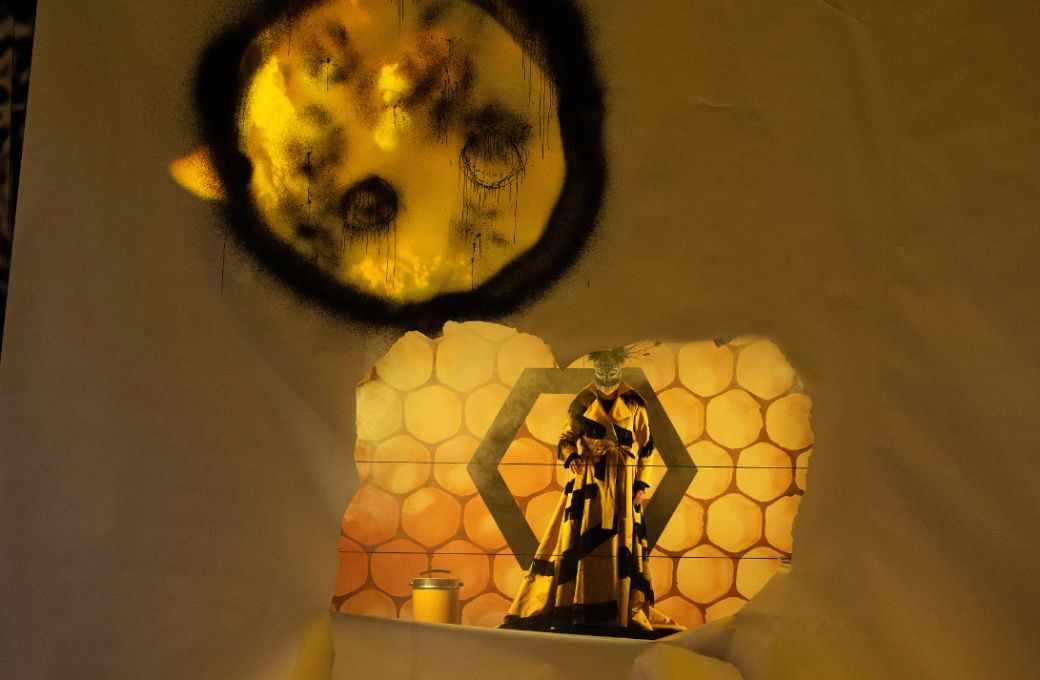Turandot, Giacomo Puccini’s final opera, marks a departure from his earlier commitment to verismo style, embracing instead a fantastical plot set in Ancient China, “in the time of fairy tales”. The story is anything but realistic. The beautiful Princess Turandot presents three riddles to any suitor, promising marriage if he solves them but death if he fails. This unusual courtship ritual is meant to avenge her ancestor, Princess Lo-u-Ling, raped and murdered during a war with the Tartars. Turandot, believing herself to be the reincarnation of Lo-u-Ling, is portrayed in the libretto as cruel and cold as ice. She often describes herself as sacred, non-human and untouchable, rejecting the very idea of love. (The emerging field of psychoanalysis clearly influenced Puccini and his librettists Giuseppe Adami and Renato Simoni.)

Sebastian Baumgarten chose a different setting for his 2023 production, revived at Oper Zürich. Instead of fairy-tale China, the environment resembles a beehive, with Turandot as the queen bee. It features many futuristic elements: Calaf, the unknown prince who solves the three riddles, wears a Superman-like costume, and Emperor Altoum, Turandot’s father, arrives on a device that looks like a spaceship or submarine. One of the main departures from the libretto is that Turandot, instead of being ascetic and untouchable, interacts with her subjects, physically touching them as she tells the story of Lo-u-Ling. When Altoum whispers to Calaf, trying to dissuade him from risking his life in the challenge, Turandot leans in to eavesdrop in a very human, almost petty manner. After Calaf's victory, he challenges the princess by stating that he will die if she can discover his name. During the night, we see Turandot roaming the city with her executioner Pu Tin Pao (in a bee costume), rummaging through papers, flustered and panicky. This portrayal eliminates her aloofness and dignity, significantly altering the narrative without adding any deeper layer of understanding.
Another radical choice was to end the performance at the point where Puccini had left the score unfinished when he died, mirroring the 1926 premiere. Large panels descended like a curtain, displaying the words spoken by the conductor Arturo Toscanini on that occasion: “Here the performance ends, because the Maestro died.” While this may have made sense at the world premiere, it now only leaves the story unfinished.
Anna Pirozzi performed Turandot with a full-bodied, velvety rich soprano voice, full of steel in the higher register and showcasing superb breath control. Her powerful voice occasionally seemed too grand for the intimate Zurich Opera House. Nevertheless, she skillfully sought nuance to express emotion, using various tonal colours and elegant details, such as delightful little portamenti. But the role is unforgiving, it requires full intensity in certain passages, and she delivered them gloriously. In the more lyrical moments, like the recounting of Lo-u-Ling’s story, her voice was soft, mellow and infused with melancholy.
Piero Pretti made a successful debut as Calaf in this production. Although his tenor may be better suited to lighter roles and his venture into heavier repertoire might concern his fans about potential strain, his portrayal of Calaf was thoroughly convincing, with effortless, full-bodied high notes. He heroically held his own against Pirozzi’s powerful “Gli enigmi sono tre”, creating an exciting experience. His phrasing was always elegant, his legato impeccable, and he beautifully utilised his extensive experience in the Verdian repertoire during the lyrical moments, such as “Non piangere, Liù”. His “Nessun dorma” was a blast.
Liù, the slave hopelessly in love with Calaf, was portrayed by Ebenita Kajtazi. Her high soprano delivered beautiful filati, though her upper register sometimes appeared too metallic and edgy, lacking the sweet timbre usually associated with this character. Nevertheless, the scene of her suicide was exceptionally well-acted and deeply moving. The three ministers, Ping, Pong and Pang, were portrayed by Xiaomeng Zhang, Cameron Becker, and Nathan Haller, dressed as high-ranking military officers with helmets resembling those of astronauts (or perhaps beekeepers). Although their interpretation occasionally veered into excessive comedy – not the fault of the singers, I’m sure – their musicality remained excellent, their voices perfectly intertwining.
David Shipley played Timur, Calaf’s father, though in this production Timur did not appear to be blind, which created some inconsistencies between the libretto and the action. Shipley's bass was strong and well-projected, but it seemed to lack elegance, with high notes often sounding pushed.
Conductor Robert Treviño led the Philharmonia Zürich in a competent performance, managing a good balance between the pit and the stage, a challenging task given Puccini's dense orchestration, which includes various “oriental” percussion. However, his support for the singers was not particularly impressive.


